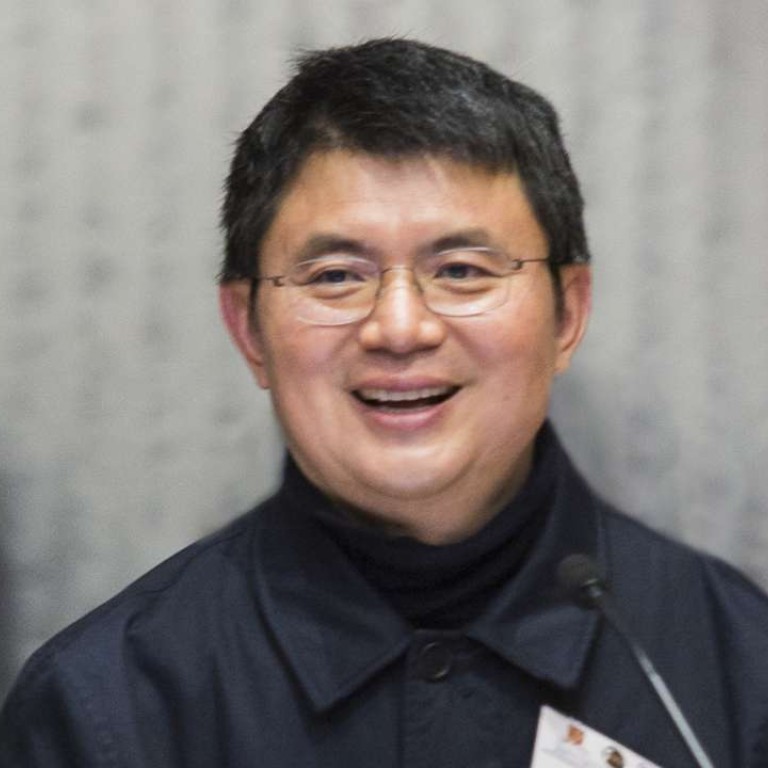
Exclusive | Source confirms missing tycoon is in mainland China, not ‘receiving treatment overseas’
Latest information contradicts front-page newspaper ad in businessman Xiao Jianhua’s name
A source close to missing billionaire Xiao Jianhua told the South China Morning Post that the tycoon is currently in mainland China.
The source, who declined to be named because of the sensitivity of the matter, said Xiao could communicate only with his family.
“His family members can communicate with him. That’s not bad, at least we know he is safe and well.”
The latest information about Xiao contradicted an advertisement in his name that appeared on the front page of a local Chinese newspaper on Wednesday morning.
Refuting earlier media reports that said he had been arrested in Hong Kong, the full-page statement printed in Ming Pao denied that Xiao had been “captured” and taken back to the mainland. It claimed the tycoon was “currently receiving treatment overseas” and would “meet the press very soon after the treatment is finished”.
“I think the Chinese government is a civilised government and [respects] the rule of law – the public should not misunderstand!” it said.
The advertisement was part of a series of puzzling events concerning the whereabouts of Xiao, 46, a high-profile tycoon said to have close ties to powerful politicians in Beijing.
Overseas Chinese media earlier reported that mainland agents had taken the businessman from Hong Kong back to the mainland on Friday. Earlier this week, Xiao’s Tomorrow Group responded with two statements in his name via its WeChat account rejecting those claims.
The two statements – along with the rest of the group’s posts – were later removed from the account.
The Wednesday advertisement said Xiao had always loved his country and had never been involved in any situation that might damage the country’s interests or the government’s image, or supported any opposition organisation.
It added that as a Canadian citizen, Xiao enjoyed the consular protection of Canada, and as a Hong Kong permanent resident, he was covered by the city’s laws. The statement said Xiao held a “diplomatic passport” and enjoyed diplomatic protection, though it did not specify which country had issued the passport.
Hong Kong police have been looking into the tycoon’s disappearance.
A government source with knowledge of the investigation said Xiao was last seen at a luxury Hong Kong hotel last week.
The source said the businessman left the Four Seasons Hotel on Friday morning accompanied by an unknown number of people.
Another source said Xiao left Hong Kong for Shenzhen at about 3pm on Friday.
This information, as well as a statement from Hong Kong police saying that Xiao had entered the mainland on Friday contradicted claims in the advertisement and in Tomorrow Group’s earlier statements that the tycoon was “overseas”.
Lawmaker James To Kun-sun of Democratic Party said the Hong Kong government had yet to come forward to clear doubts about the incident two days after it was reported by overseas media. He urged officials to clarify as soon as possible whether the government had any involvement in the incident, whether Xiao was a Hong Kong permanent resident, and whether he had been forced to leave the city under duress.
Speaking on Commercial Radio on Wednesday, Lee said Xiao’s case did not seem to involve cross-border law enforcement, but admitted that the notification mechanism between the mainland and Hong Kong on such events should be enhanced.
“The government has failed to solve these problems for a long time,” she said. “After I left the government, there was no follow-up on the issue.”
If I were the chief executive, I or my appointed official would approach the proper authorities on the mainland
Ip said she would push through these arrangements if she was elected chief executive.
Woo added that if elected, he would not allow mainland or foreign officials to enforce any law in the city and argued that a clear stance would be needed to “win back people’s confidence in ‘one country, two systems’”.
“If I were the chief executive, I or my appointed official would approach the proper authorities on the mainland to inquire as to what exactly happened and take appropriate action if abduction had occurred,” he said.
While he appreciated the concern shown by Hongkongers over the case, Woo added that the public should wait for more facts and details to surface before jumping to any conclusions.


